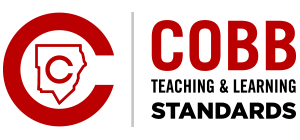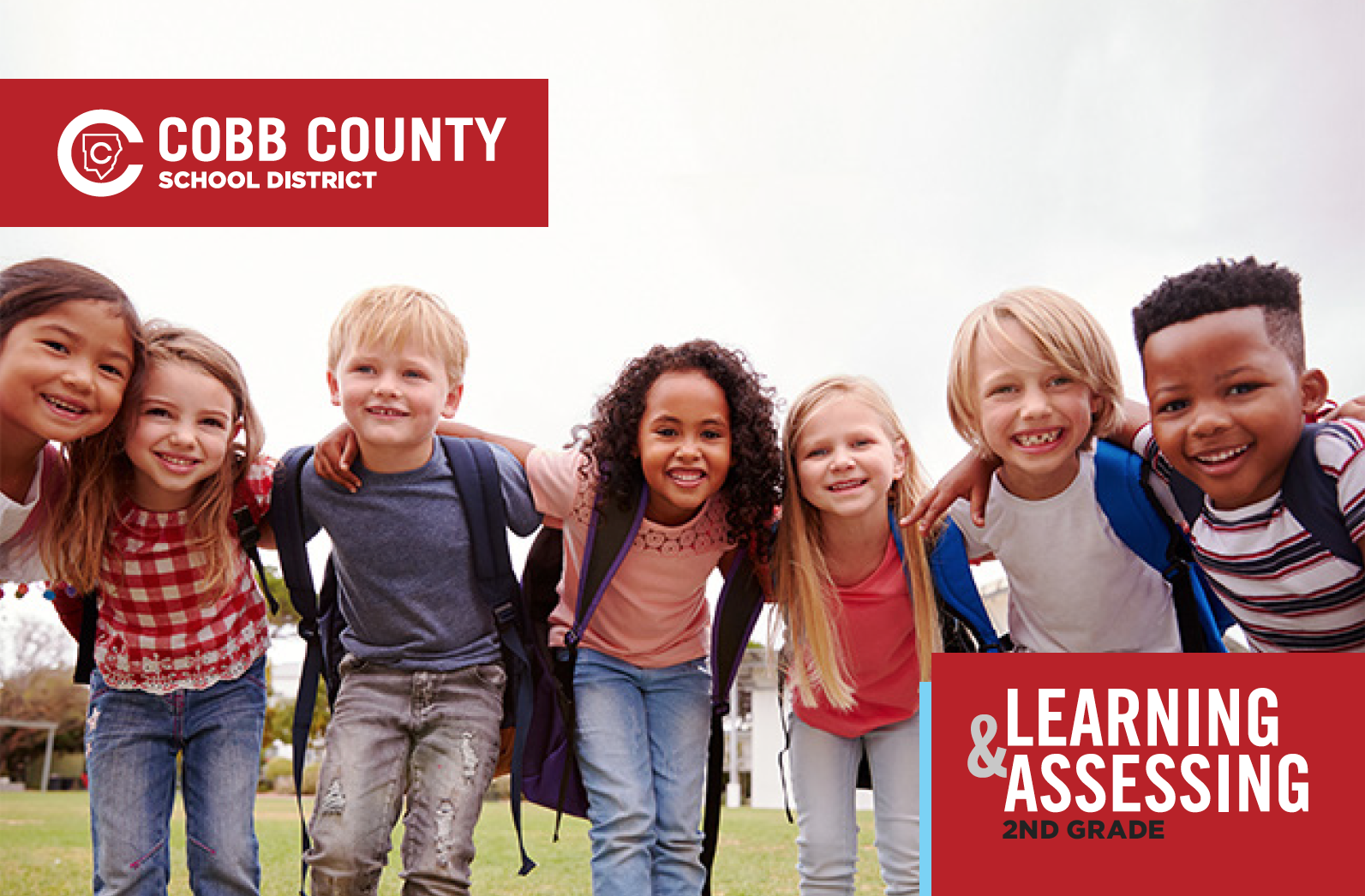2nd Grade Learning

What Do Students Learn In 2nd Grade?
2nd GRADE LEARNING:
The Cobb County School District is committed to providing your child an academic experience that will develop his or her knowledge and skills at every grade-level and to ensuring a strong foundation is established for your child to reach his or her greatest potential. Our teaching is aligned with content standards and our teachers bring those standards to life for your child through various strategies designed to meet your child’s learning strengths and needs.
In Cobb County classrooms, students are immersed every day in learning experiences based on exploration, problem-solving, and critical thinking in all content areas, including the core areas of English Language Arts, Mathematics, Social Studies, and Science; and in specialized academic content including Health, Music, Physical Education, Technology, Visual Arts, and World Languages*. Excellence in teaching guides your child’s educational experience from Kindergarten to graduation and into life.
*Programming available varies at local schools
ENGLISH LANGUAGE ARTS:
Second graders begin to read more with accuracy and fluency. Having a firmer grasp on phonics, second graders begin more complex word studies. They begin to read longer, more complex texts, including chapter books. They continue to read every day and have books read to them. Writing becomes more independent for second graders as they write in a variety of genres. Students become much more conscientious about editing and revising their work. Second graders begin to use more symbolic language, such as concepts (courage, freedom, time, seasons), in their writing and verbal interactions. Conventions become a part of the everyday writing experience for second graders. They learn important parts of speech and how to manipulate language to suit their contexts. They expand sentences and learn new sentence structures and the punctuation that occurs with them. Their written and spoken language becomes much more complex. Second graders show evidence of a vastly expanding language repertoire, including the use of a variety of language registers. They engage in a variety of language and literary activities as they gain independence and mastery of reading, writing, speaking, and listening. While the Second Grade GSE make clear specific expectations for reading, writing, speaking, listening, and language, these standards need not be a separate focus for instruction. Often, several standards can be addressed by a single rich task
MATHEMATICS:
In Grade 2, instructional time should regularly incorporate the 8 Mathematical Practices, the Statistical Reasoning Framework, and the Mathematical Modeling Framework through four big ideas of content: (1) numerical reasoning, (2) measurement and data (statistical) reasoning, (3) patterning and algebraic reasoning, and (4) geometric and spatial reasoning.
SCIENCE:
Science in second grade centers on a hands-on, student-centered exploration of our natural world. Earth, Life and Physical Science are studied throughout the year, giving students opportunities to build their understanding of core ideas while developing scientific skills such as conducting investigations and analyzing data. The changing seasons are studied throughout the year as students investigate the life cycles of living things and environmental changes and causes. Finally, students explore the nature of matter, the sun, moon and stars and the effects of forces on objects.
SOCIAL STUDIES:
In second grade, the various social studies strands become interwoven with the historical strand. The history strand focuses on important historical figures in Georgia and the Muscogee (Creek) and Cherokee cultures in Georgia. The geography strand emphasizes the geography of Georgia and relates to the historical study. In addition to the positive character traits of the individuals and groups in the historical strand, the basic concept of government is also introduced. Basic economics concepts continue to be introduced.
SPECIALS:
Awareness of the elements of creativity inspires 2nd graders in Visual Arts and Music. Building on basic experiences in Music, students expand the use of pitch and rhythm concepts to create musical sentences and pentatonic melodies. Learning is deepened through an understanding of patterns and musical form. The Visual Arts allow students to explore formal and expressive qualities of art and create their own works using additional art elements and design principles. In Health, students explore personal health and safety, illness, and disease prevention. PE gives students foundational knowledge of physical fitness, coordination and skill development.
PARENTS TIPS: Reading
Daily reading as a family is an enjoyable and important way to grow a love of learning. Create time to read during breakfast or in the evening before bed. Share your own favorite childhood books and talk about why the book is one you still love. Visit your local library and take advantage of school book fairs and literacy events. By sharing what you love about reading and showing them how much it means to you by reading with them, students will see how important literacy is in their lives.
How Do We Assess Students In 2nd Grade?
Your child will have a variety of classroom assessments that will aid his or her teacher in knowing how to provide the best possible instruction for your child. These assessments will also help you know how well your child is learning and what extra support may be needed. In addition, your child will participate in some standardized assessments that are used to gauge how well your child is doing in his or her grade level.
All students in grades K-9 participate in the universal screening process for reading and math using a digital inventory. Your second grader’s proficiency and progress in reading and math will be measured three times a year using the reading inventory and math inventory.
PARENT TIPS: Assessment
Parents can support students in easing any concern or anxiety about assessment:
- Talk with your child about any tests or assessments.
- Explain that assessment is a natural and important part of any learning. Tests help students understand their thinking better and make improvements for better performance in the future.
- Remind your child to pay attention to the directions and to listen carefully as they are read. Encourage your child to take time to understand the questions before selecting an answer.
- A good night’s rest is the best way to arrive focused on test day!
Remember that assessment is an important and helpful part of learning for students of all ages. Your support and involvement in your child’s education is critical to success in school and in life. Research shows when parents play a key role in their child’s learning, their child’s achievement excels.
What Instructional Resources Are Used In 2nd Grade?
CLICK HERE TO DOWNLOAD THE BOARD APPROVED INSTRUCTIONAL RESOURCES FOR SECOND GRADE
Instructional resources are provided to students and teachers to support teaching and learning. The titles listed below have been recommended to our Board by a committee of teachers, parents and community representatives and approved through the textbook adoption process (See Board Rule IFAA-R). Additional resources to enhance the instruction are constantly added by local schools and individual teachers.
Course/Content Area | Resource | Publisher |
English Language Arts | Scholastic Leveled Bookroom | Scholastic |
English Language Arts | Benchmark Phonics | Benchmark |
English Language Arts | Units of Study Writing | Heinemann |
Mathematics | Custom Developed Mathematics Content for Grade 2 | Cobb County School District |
Science | Georgia Science, Grade 2 | HMH |
Science | Science Dimensions, Grade 2 | HMH |
Social Studies | Studies Weekly | Studies Weekly |
What Is My Student's Framework For Learning In 2nd Grade?
What Does The Second Grade Report Card Look Like?
English – Second Grade Report Card (Rev. 3/24)
Español – Boleta de Calificaciones 2er Grado (Rev. 3/24)
Portugues – Boletim da 2a Série (Rev. 3/24)

Cobb Teaching & Learning Standards - English Language Arts
CLICK HERE TO DOWNLOAD 2nd GRADE COBB TEACHING & LEARNING STANDARDS FOR ELA
Cobb Teaching & Learning Standards - Mathematics
CLICK HERE TO DOWNLOAD 2nd GRADE COBB TEACHING & LEARNING STANDARDS FOR MATH
Cobb Teaching & Learning Standards - Social Studies
CLICK HERE TO DOWNLOAD 2nd GRADE COBB TEACHING & LEARNING STANDARDS FOR SOCIAL STUDIES
Cobb Teaching & Learning Standards - Science
CLICK HERE TO DOWNLOAD 2nd GRADE COBB TEACHING & LEARNING STANDARDS FOR SCIENCE

